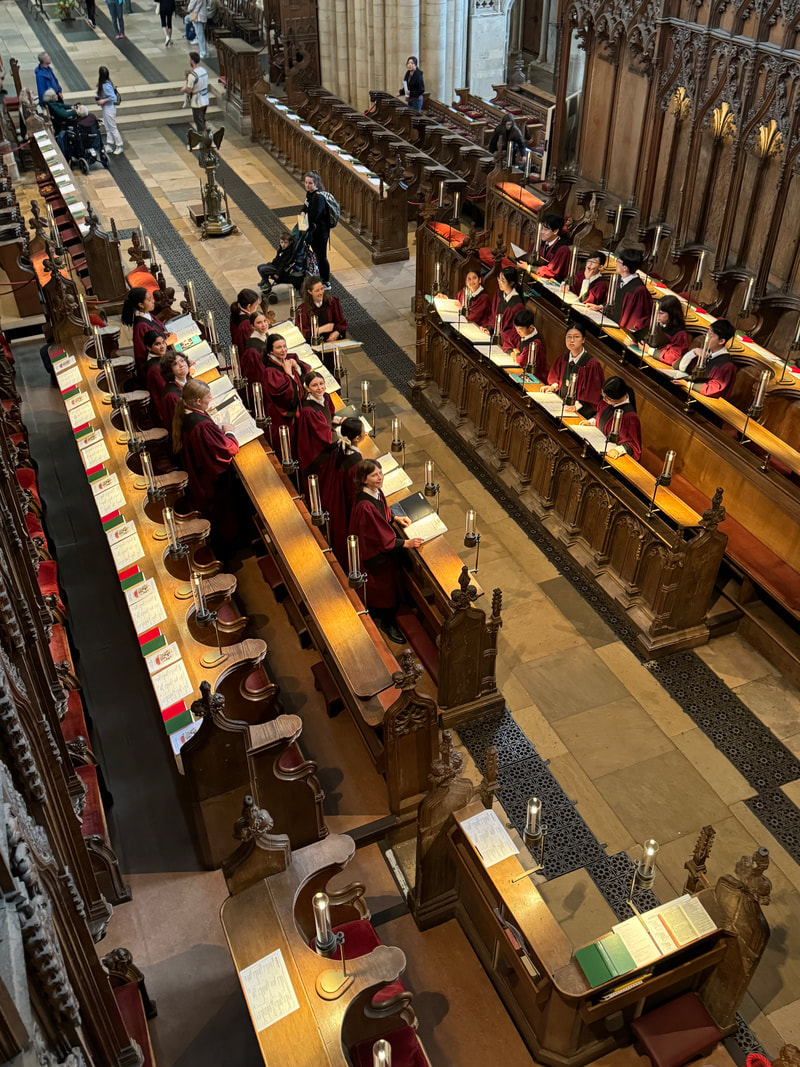Please join us for monthly services of Choral EVensong
Join the Choristers for the ancient and beautiful service of Choral Evensong, which is sung monthly on Thursday evenings at Metropolitan. All services begin at 645 and last until roughly 730. The services are fully choral, in the great English Cathedral tradition.
Thursday, September 19, 2024 - 645 PM
Thursday, October 17, 2024 - 645 PM
Thursday, November 14 , 2024 - 645 PM
Thursday, January 16, 2025 - 645 PM
Thursday, February 27, 2025 - 645 PM
Saturday, March 29, 2025 - 500 PM
Thursday, May 15, 2025 - 645 PM
Thursday, September 19, 2024 - 645 PM
Thursday, October 17, 2024 - 645 PM
Thursday, November 14 , 2024 - 645 PM
Thursday, January 16, 2025 - 645 PM
Thursday, February 27, 2025 - 645 PM
Saturday, March 29, 2025 - 500 PM
Thursday, May 15, 2025 - 645 PM
About CHoral Evensong
Choral Evensong is a church service traditionally held near sunset focused on singing psalms and other biblical canticles. It is loosely based on the canonical hours of vespers and compline. Old English speakers translated the Latin word vesperas as æfensang, which became 'evensong' in modern English. Typically used in reference to the Anglican daily office's evening liturgy, it can also refer to the pre-Reformation form of vespers or services of evening prayer from other denominations, particularly within the Anglican Use of the Catholic Church.
Evensong was initially sung entirely to plainsong. Musicians gradually created polyphonic settings of its music, especially of the Magnificat. The first musical setting of the Book of Common Prayer, by John Marbeck, provided a simplified version of traditional chant settings. It remains unclear whether plainsong remained a common feature of evensong in the Church of England after the sixteenth century. Metrical psalms and Anglican Chant were also developed as alternate methods of singing the psalms and canticles.
In choral evensong, all of the service is sung or chanted by the officiating minister and a choir. In cathedrals, or on particularly important days in the church calendar, the canticles are performed in elaborate settings. In churches where a choir is not present, simpler versions of the psalms and canticles are usually sung by the congregation, sometimes with responses and collects spoken rather than sung. Said evening prayer services with the musical setting omitted are also sometimes referred to as evensong.
A number of composers have contributed settings of the canticles. These range from late Renaissance composers such as Thomas Tallis, William Byrd and Orlando Gibbons, through Victorian composers such as Charles Villiers Stanford, Thomas Attwood Walmisley to later masters of the form such as Herbert Murrill, Basil Harwood, Herbert Howells, Michael Tippett, Giles Swayne, and Arvo Pärt (who composed a Magnificat and Nunc dimittis at different times).
Evensong was initially sung entirely to plainsong. Musicians gradually created polyphonic settings of its music, especially of the Magnificat. The first musical setting of the Book of Common Prayer, by John Marbeck, provided a simplified version of traditional chant settings. It remains unclear whether plainsong remained a common feature of evensong in the Church of England after the sixteenth century. Metrical psalms and Anglican Chant were also developed as alternate methods of singing the psalms and canticles.
In choral evensong, all of the service is sung or chanted by the officiating minister and a choir. In cathedrals, or on particularly important days in the church calendar, the canticles are performed in elaborate settings. In churches where a choir is not present, simpler versions of the psalms and canticles are usually sung by the congregation, sometimes with responses and collects spoken rather than sung. Said evening prayer services with the musical setting omitted are also sometimes referred to as evensong.
A number of composers have contributed settings of the canticles. These range from late Renaissance composers such as Thomas Tallis, William Byrd and Orlando Gibbons, through Victorian composers such as Charles Villiers Stanford, Thomas Attwood Walmisley to later masters of the form such as Herbert Murrill, Basil Harwood, Herbert Howells, Michael Tippett, Giles Swayne, and Arvo Pärt (who composed a Magnificat and Nunc dimittis at different times).
